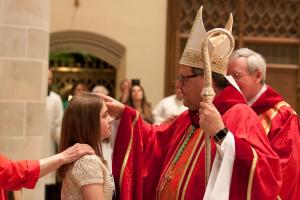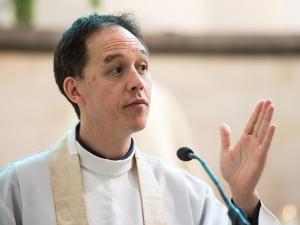
Celebrations of Grace: The Sacraments of the Catholic Church, Part 13
It wasn’t easy to decide what to tell 11th graders about the Sacrament of Confirmation. From their older brothers and sisters to their teachers to the shape of the Confirmation program itself, the common perception of the sacrament is: “sacrament of maturity in the faith.”
Joanna Wahlund (“Stop Holding the Sacraments Hostage: Confirmation”) has an excellent critique of this way of looking at Confirmation. My textbook didn’t say Confirmation is the sacrament of maturity, but it didn’t say it isn’t either.
These were 11th graders. There was a time when that was nearly old enough to be an adult in society, to think about getting married, to start a career. But these adult things are four or more years in the future for most of this class. Add in the fact that many of the young people were in class only because of parent pressure.
Confirmation as gift
I received Confirmation as a fourth grader, and the teaching I got definitely spoke of maturity. I was told I would receive the grace to be a “soldier of Christ.” I would be ready to suffer and die for the faith like so many martyrs of old. It was a romantic notion that I readily accepted at that naïve age. It didn’t hurt that all the martyrs I learned about lived in the distant past.
The thing is, this grace to be a soldier of Christ – or the grace to personally affirm my baptismal vows, as we usually say today – is what I was to receive with Confirmation. It would be Confirmation’s gift, not something I earned. That’s not the impression that our Confirmation program gives today. We have requirements, like so many service hours and only so many missed classes or you’ll have make-up work. We still teach grace is a gift, but the program teaches it’s a gift you have to earn in this case.
Readiness for Confirmation and bats in church
The focus of our program was to be ready for Confirmation. By the program’s end the pastor and program leaders were to judge each candidate on that point. I struggled against the idea that readiness meant willingness to become an adult in the Church or to commit oneself to Christ.
Some in my class came from families who faithfully practiced their Catholic faith. Some did not. Either way, for most of them adult commitment to Jesus or the Church lay a long way off. Many years of “Faith Formation” had not given them even a basic understanding of the Church, her teachings and what they would be committing to. (That’s a topic for a different post.)
A sacrament celebrates graces God gives to the Church, both as a body and individual members. What I ended up telling my class is:
The life of faith is a journey, and on a journey you don’t stay in one place very long. God gives you the graces you need all along the way. If you are ready to celebrate your journey and your abilities and whatever courage God is giving you to take just the next step, you are ready for Confirmation.
But what about the following steps? Would my students continue learning about their Catholic faith? Here’s where the program’s structure worked most powerfully against its own purposes. Confirmation, coming at the end of 12 or so years, just looks and feels like a graduation from faith formation. This old joke from U.S. Catholic tells me that’s a common problem:
Fr. Brown was complaining to Fr. Smith about bats in the church. “I just can’t get rid of them, and I’ve tried everything.” Fr. Smith said, “I just had the bishop come and confirm my bats. They never returned.”
Restoring the order of the Sacraments of Initiation
Confirmation as graduation, or as reward for staying in a faith formation program until the very end. Practically and theologically, that’s a problem. Some dioceses mitigate it by placing the celebration of Confirmation in the middle of their religious education programs. A few have taken a more radical step.
Confirmation is one of three Sacraments of Initiation: Baptism, Confirmation, and Eucharist. This is the sequence in which the early Church celebrated these sacraments. The Rite of Christian Initiation of Adults has restored in the original order. A few dioceses are saying, Let that same order apply to Catholics who were baptized as infants.
According to the Team RCIA website, 13 dioceses in the U.S. and several in Canada have moved Confirmation to around age seven, before the reception of First Communion. Quoting from that website:
In 1910, Pius X wanted to end the delay of admitting children to the Eucharist. It was common practice in the western Church to delay brining children to the table until they were twelve or fourteen. Pius lowered the age for first communion to the age of reason or about age seven. That had the unreflected result of placing the celebration of Eucharist before confirmation.
Once that happened, our pastoral understanding of the need for the sacrament of confirmation began to wander off into uncharted ground. If in the celebration of the Eucharist we receive the fullness of Christ, what does confirmation do? An understandable, but incorrect, conclusion was that confirmation would be a mature affirmation of the faith promised at baptism and the fullness received in Eucharist.
Confirmation was, seemingly, no longer ordered to Eucharist but something added to Eucharist. Maybe, just a further requirement before a person could get married in the Church.
Confirmation, a gift for the Church
Putting Confirmation in its proper place, before Eucharist makes the moment of Confirmation less crucial for the individual person. After all, Eucharist is the crucial sacrament. But Confirmation is an important moment in the life of the Church. The presence of the bishop implicitly affirms this importance. When possible, parishes schedule Confirmation at a regular parish Mass. Confirmation celebrates graces God gives to all of us.
Not just family and sponsors but the Christian community joins in a whole-parish celebration. Along with the confirmands, we celebrate our own ongoing journeys of faith, the journey of their faith community, and that of the entire Church. We celebrate the gifts of the Spirit, which come not to one individual at a time but as we all grow together and in all the ways we support each other.
What stands out for me in my own Confirmation experience is the spiritual gift of courage. As a parent I recognized how important courage is for my children and my own role in fostering that gift. When there are difficult decisions to make, difficult steps to take, or difficult changes to go through, there is no greater support we can give to one another than encouragement. As Christians we are challenged to believe in each other’s gifts and to communicate that belief.
When a person is baptized, the community promises to support him or her on this new journey of faith. Teachers and mentors, sponsors, and all who come together to celebrate with those being confirmed help make good on this promise. We support each other on our way and come together in Confirmation to celebrate the journey, the gifts of the Spirit, and the support.
Image credit: Greensburg Diocese via Google Images












